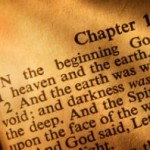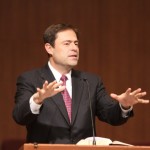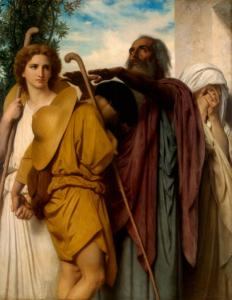 From the” announced Rolf Heuer, director of the European Center for Nuclear Research (CERN) on July 4. “We have a discovery. We have observed a new particle that is consistent with a Higgs boson.” Thundering applause resounded from the packed auditorium in Geneva and at the 36th International Conference on High Energy Physics in Melbourne, Australia, which was linked by a live feed.4 Joe Incandela and Fabiola Gianotti, the heads of the two large teams of scientists at CERN, announced they have detected a new subatomic particle consistent with the elusive Higgs boson, commonly called the “god particle.”
From the” announced Rolf Heuer, director of the European Center for Nuclear Research (CERN) on July 4. “We have a discovery. We have observed a new particle that is consistent with a Higgs boson.” Thundering applause resounded from the packed auditorium in Geneva and at the 36th International Conference on High Energy Physics in Melbourne, Australia, which was linked by a live feed.4 Joe Incandela and Fabiola Gianotti, the heads of the two large teams of scientists at CERN, announced they have detected a new subatomic particle consistent with the elusive Higgs boson, commonly called the “god particle.”
The Standard Model of physics is the currently most-accepted model to explain how the physical universe works. Within the Standard Model, which involves quantum physics, some high-energy particles—like electrons and quarks, the tiny particles comprising protons and neutrons—have rest-mass, and other particles—photons, essentially particles of light energy—have no rest-mass. But the Standard Model has not found the reason some particles have rest-mass and others do not. Theoretically, the universe is filled with a Higgs field mediated by Higgs bosons that impart rest-mass to particles of matter as they interact with it.5 The Higgs boson thus is the theoretical—and now likely observed—subatomic particle that imparts rest-mass to matter.
Mass is a measure of how much matter something contains. Gravity acts on mass to give things weight and ultimately to hold the physical universe together.
Such a subatomic particle is extremely unstable. Therefore, in an effort to find proof of the existence of the elusive particle and then to study its characteristics, physicists have for several years been colliding beams of high-energy protons in the 17-mile long Large Hadron Collider under the Alps. They study the debris resulting from the collisions in search of subatomic particles. Now that a subatomic particle closely fitting the expected characteristics of the predicted Higgs boson has been repeatedly found by the two teams, they believe they’ve found it. Read more about the physics involved and the significance of the findings atBeams Collide Today in Expensive Hadron Collider.
Over the past months there have been rumors and hints that this discovery was imminent. In particle physics, for a discovery to be deemed truly “discovered,” it must be detected repeatedly such that there is only the remotest possibility that the signals detected could have resulted from random chance. This is called a “five –sigma” level of certainty, and that is the benchmark that has finally been reached. 6
Notably, as further testing examines the nature of this subatomic particle, physicists hope to learn more about the way the universe works. As with the results thus far, repeatable observations are made and the data interpreted and compared with hypotheses and predictions. This is an excellent example of how experimental science works and how science can help us understand the way God upholds His creation.
What these results do not (and will not) reveal, as many media pundits suggest, is how the universe originated. British scientist Peter Higgs—who was on hand in Geneva for the announcement6—postulated the existence of the Higgs field that produces the Higgs boson “as the way that matter obtained mass after the universe was created in the Big Bang.7 As one of the CERN researchers added, “Without it, or something like it, particles would just have remained whizzing around the universe at the speed of light.”7
Although many believe the collision of the proton beams in the LHC re-creates the conditions of the big bang and therefore claim the Higgs discovery will unlock the secret of how the universe blew into existence without God, it does no such thing. The ability to create a situation in a present-day well-designed and enormously expensive laboratory does not prove the situation ever came about naturally in the past or that such an event produced the universe in which we live. A discovery that deepens our understanding of the nature of matter and energy does not rule out a supernaturally created origin for that matter and energy.
“Thanks, nature!” Gianotti said to laughter, alluding to the unpopular layman’s term for the Higgs boson, the “god particle.” The term was coined by physicist Leon Lederman, much to the consternation of Higgs and many in the Higgs-hunting business,8 due to his book title, The God Particle: If the Universe is the Answer, What is the Question? But though the Higgs boson can help us better understand the way the physical universe works and fill in the gaps in the Standard Model of physics, it does not explain how the universe could come into existence without allowing “a divine foot in the door.”9

 “Yet when a preacher exhorts a congregation on a topic of his choosing, using biblical texts only to back up his point, he will never preach more than what the preacher already knows. Expositional preaching requires more than that. It requires careful attention to the context of a passage, because it aims to make the point of the biblical text the point of the sermon. When a preacher exhorts a congregation by preaching a passage of Scripture in context-where the point of the passage is the point of his sermon- both he and the congregation will end up hearing things from God that the preacher did not intend to say when he first sat down to study and prepare for the sermon.”
“Yet when a preacher exhorts a congregation on a topic of his choosing, using biblical texts only to back up his point, he will never preach more than what the preacher already knows. Expositional preaching requires more than that. It requires careful attention to the context of a passage, because it aims to make the point of the biblical text the point of the sermon. When a preacher exhorts a congregation by preaching a passage of Scripture in context-where the point of the passage is the point of his sermon- both he and the congregation will end up hearing things from God that the preacher did not intend to say when he first sat down to study and prepare for the sermon.” “It shall greatly helpe ye to understande Scripture, If thou mark Not only what is spoken or wrytten, But of whom, And to whom, With what words, At what time, Where, To what intent, With what circumstances, Considering what goeth before, And what followeth.” – John Wycliffe
“It shall greatly helpe ye to understande Scripture, If thou mark Not only what is spoken or wrytten, But of whom, And to whom, With what words, At what time, Where, To what intent, With what circumstances, Considering what goeth before, And what followeth.” – John Wycliffe Wikipeadia says of this book, “The Book of Tobit (Book of Tobias in the Vulgate; from the Greek: ?????, and Hebrew: ???? Tobi “my good”, also called the Book of Tobias from the Hebrew ????? Tobiah “Yahweh is my good”) is a book of scripture that is part of the Catholic and Orthodox biblical canon, pronounced canonical by the Council of Carthage of 397 and confirmed for Roman Catholics by the Council of Trent (1546). It is listed as a book of the “Apocrypha” in Article VI of the Thirty-Nine Articles of the Church of England (Article VI at episcopalian.org). Tobit is regarded by Protestants as apocryphal because it has never been included within the Tanakh and considered canonical by ancient Judaism.”
Wikipeadia says of this book, “The Book of Tobit (Book of Tobias in the Vulgate; from the Greek: ?????, and Hebrew: ???? Tobi “my good”, also called the Book of Tobias from the Hebrew ????? Tobiah “Yahweh is my good”) is a book of scripture that is part of the Catholic and Orthodox biblical canon, pronounced canonical by the Council of Carthage of 397 and confirmed for Roman Catholics by the Council of Trent (1546). It is listed as a book of the “Apocrypha” in Article VI of the Thirty-Nine Articles of the Church of England (Article VI at episcopalian.org). Tobit is regarded by Protestants as apocryphal because it has never been included within the Tanakh and considered canonical by ancient Judaism.” “Finally, I worry that a movement built on megachurches, megaconferences, and megaleaders does the church a disservice in one very important way that is often missed amid all the pizzazz and excitement: it creates the idea that church life is always going to be big, loud, and exhilarating, and thus gives church members and ministerial candidates unrealistic expectations of the normal Christian life. In the real world, many, perhaps most, of us worship and work in churches of a hundred people or fewer; life is not loud and exciting; big things do not happen every Sunday; budgets are incredibly tight and barely provide enough for a pastor’s modest salary; each Lord’s Day we go through the same routines of worship services, of hearing the gospel proclaimed, of taking the Lord’s Supper, of teaching Sunday School; perhaps several times a year we do leaflet drops in the neighborhood with very few results; at Christmastime we carol sing in the high street and hand out invitations to church, and maybe two or three people actually come along as a result; but no matter—we keep going, giving, and praying as we can; we try to be faithful in the little entrusted to us. It’s boring, it’s routine, and it’s the same, year in, year out.
“Finally, I worry that a movement built on megachurches, megaconferences, and megaleaders does the church a disservice in one very important way that is often missed amid all the pizzazz and excitement: it creates the idea that church life is always going to be big, loud, and exhilarating, and thus gives church members and ministerial candidates unrealistic expectations of the normal Christian life. In the real world, many, perhaps most, of us worship and work in churches of a hundred people or fewer; life is not loud and exciting; big things do not happen every Sunday; budgets are incredibly tight and barely provide enough for a pastor’s modest salary; each Lord’s Day we go through the same routines of worship services, of hearing the gospel proclaimed, of taking the Lord’s Supper, of teaching Sunday School; perhaps several times a year we do leaflet drops in the neighborhood with very few results; at Christmastime we carol sing in the high street and hand out invitations to church, and maybe two or three people actually come along as a result; but no matter—we keep going, giving, and praying as we can; we try to be faithful in the little entrusted to us. It’s boring, it’s routine, and it’s the same, year in, year out. John Piper:
John Piper: Happy 4th of July to all our American readers.
Happy 4th of July to all our American readers.